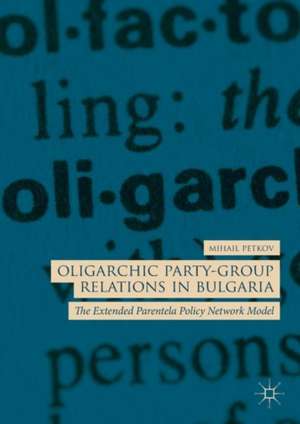Oligarchic Party-Group Relations in Bulgaria: The Extended Parentela Policy Network Model
Autor Mihail Petkoven Limba Engleză Hardback – 15 oct 2018
This book argues that the relationship between political parties, civil service and party insider groups in Bulgaria is oligarchic. It also argues that these oligarchic dynamics overlap with the parentela policy network, which is a relationship where a ruling party interferes with the civil service to the benefit of its own insider group. In Bulgaria, party-wide executive appointments attract businesses to seek insider status hoping to expand their activities through prejudiced regulatory inspections as one form of executive interference. Such inspections constitute a veiled attempt to coerce a business, which is in a direct market competition with the party insider or in party political opposition. Any such successful party-insider relationship forms an oligarchic elite, which then converts political access into capital and coerces its rivals into losing parliamentary elections. When ruling parties change, the cycle is repeated, as the newly formed elite seeks to check all and any rivals.
| Toate formatele și edițiile | Preț | Express |
|---|---|---|
| Paperback (1) | 322.17 lei 39-44 zile | |
| Springer International Publishing – 26 dec 2018 | 322.17 lei 39-44 zile | |
| Hardback (1) | 331.25 lei 39-44 zile | |
| Springer International Publishing – 15 oct 2018 | 331.25 lei 39-44 zile |
Preț: 331.25 lei
Nou
Puncte Express: 497
Preț estimativ în valută:
63.38€ • 66.05$ • 52.48£
63.38€ • 66.05$ • 52.48£
Carte tipărită la comandă
Livrare economică 31 martie-05 aprilie
Preluare comenzi: 021 569.72.76
Specificații
ISBN-13: 9783319988986
ISBN-10: 3319988980
Pagini: 164
Ilustrații: XIII, 183 p. 4 illus.
Dimensiuni: 148 x 210 mm
Greutate: 0.36 kg
Ediția:1st ed. 2019
Editura: Springer International Publishing
Colecția Palgrave Macmillan
Locul publicării:Cham, Switzerland
ISBN-10: 3319988980
Pagini: 164
Ilustrații: XIII, 183 p. 4 illus.
Dimensiuni: 148 x 210 mm
Greutate: 0.36 kg
Ediția:1st ed. 2019
Editura: Springer International Publishing
Colecția Palgrave Macmillan
Locul publicării:Cham, Switzerland
Cuprins
Chapter 1: The Extended Parentela.- Chapter 2: The Parentela through the Eyes of Bulgarian Policy-Makers.- Chapter 3: La Palombara’s Parentela in Bulgaria: The Case of Public Procurement Contracts (Public Tenders).- Chapter 4: Type Two Parentela as an Instrument of Coercion.- Chapter 5: The Extended Parentela as a Model of Party-Centric Oligarchic Relations in Bulgaria.- Chapter 6: Ukraine Under Kuchma – an Illustration of the Link Between the Extended Parentela and Consolidated Oligarchy.- Chapter 7: The Parentela and Oligarchy.
Notă biografică
Mihail Petkov is an independent researcher and journal reviewer. Apart from Bulgarian politics, he is interested in political elites, policy-making networks, power relations between policy-making actors and the development of democracy.
Textul de pe ultima copertă
This book argues that the relationship between political parties, civil service and party insider groups in Bulgaria is oligarchic. It also argues that these oligarchic dynamics overlap with the parentela policy network, which is a relationship where a ruling party interferes with the civil service to the benefit of its own insider group. In Bulgaria, party-wide executive appointments attract businesses to seek insider status hoping to expand their activities through prejudiced regulatory inspections as one form of executive interference. Such inspections constitute a veiled attempt to coerce a business, which is in a direct market competition with the party insider or in party political opposition. Any such successful party-insider relationship forms an oligarchic elite, which then converts political access into capital and coerces its rivals into losing parliamentary elections. When ruling parties change, the cycle is repeated, as the newly formed elite seeks to check all and any rivals.
Mihail Petkov is an independent researcher and journal reviewer. Apart from Bulgarian politics, he is interested in political elites, policy-making networks, power relations between policy-making actors and the development of democracy.
Caracteristici
Uncovers new dynamics of the parentela policy network Examines one of the most difficult to research areas of party-group relations Argues that state capture is not external but organized from within Hypothesises that with the future reiteraton of the extended parentela and decline of party competition the Bulgarian polity will transition to an oligarchic regime
